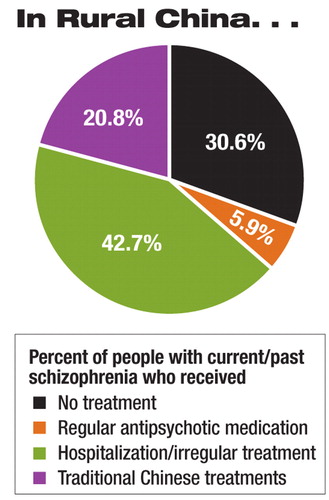Many Untreated in Developing Countries

In rural China, rural Ethiopia, and Chennai, India, community surveys found large numbers of patients who received little or no treatment for schizophrenia or were receiving traditional remedies.
The survey in Chennai identified a cohort of 261 persons with a diagnosis of schizophrenia, of whom 28.7 percent had never received treatment even though they lived in close proximity to public general hospitals with psychiatric units and to a large mental hospital. Compared with those who had received treatment, those in the untreated group were, on average, older and more likely to be unemployed, illiterate, and living in an extended family. Clinically, the untreated group was more likely to be symptomatic and suffering from severe global disability.
In rural China a survey identified 510 persons who had a current diagnosis or history of schizophrenia. Of these, 30.6 percent had never received any treatment (see chart).
In rural Ethiopia a community survey identified 321 persons with schizophrenia of whom 88.8 percent had never received treatment with antipsychotic medications. At one- to four-year follow-ups, these individuals displayed a significantimprovement in positive symptoms, a result attributed to the antipsychotic medication that was offered free to all of them.
“These findings suggest that good outcomes cannot be assumed for untreated schizophrenia in low- and middle-income countries and that treatment does make a significant difference,” Alex Cohen, Ph.D., and colleagues stated in their report in Schizophrenia Bulletin (see Original article: Data Refute Belief About Schizophrenia Outcomes). ▪.



